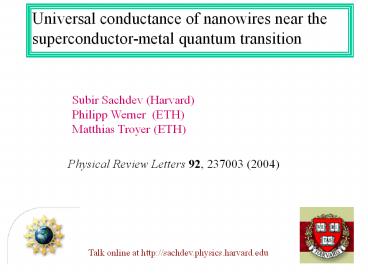Subir Sachdev (Harvard)
Title:
Subir Sachdev (Harvard)
Description:
Universal conductance of nanowires near the superconductor-metal quantum transition ... Important property of ground state at g=gc : temporal and spatial scale ... –
Number of Views:116
Avg rating:3.0/5.0
Title: Subir Sachdev (Harvard)
1
Universal conductance of nanowires near the
superconductor-metal quantum transition
Subir Sachdev (Harvard) Philipp Werner
(ETH) Matthias Troyer (ETH)
Physical Review Letters 92, 237003 (2004)
Talk online at http//sachdev.physics.harvard.edu
2
Why study quantum phase transitions ?
gc
g
- Critical point is a novel state of matter
without quasiparticle excitations
- Critical excitations control dynamics in the
wide quantum-critical region at non-zero
temperatures.
3
- Outline
- Quantum Ising Chain
- Landau-Ginzburg-Wilson theory
Mean field theory and
the evolution of the excitation
spectrum.
- Superfluid-insulator transition Boson Hubbard
model at integer filling. - Superconductor-metal transition in
nanowires Universal conductance and sensitivity
to leads
4
I. Quantum Ising Chain
5
I. Quantum Ising Chain
6
(No Transcript)
7
Experimental realization
LiHoF4
8
Weakly-coupled qubits
Ground state
9
Weakly-coupled qubits
Quasiparticle pole
Three quasiparticle continuum
3D
Structure holds to all orders in 1/g
10
Strongly-coupled qubits
Ground states
11
Strongly-coupled qubits
Two domain-wall continuum
2D
Structure holds to all orders in g
12
Entangled states at g of order unity
13
Critical coupling
No quasiparticles --- dissipative critical
continuum
14
S. Sachdev and J. Ye, Phys. Rev. Lett. 69, 2411
(1992). S. Sachdev and A.P. Young, Phys. Rev.
Lett. 78, 2220 (1997).
15
- Outline
- Quantum Ising Chain
- Landau-Ginzburg-Wilson theory
Mean field theory and
the evolution of the excitation
spectrum.
- Superfluid-insulator transition Boson Hubbard
model at integer filling. - Superconductor-metal transition in
nanowires Universal conductance and sensitivity
to leads
16
II. Landau-Ginzburg-Wilson theory
Mean field theory and the evolution of the
excitation spectrum
17
(No Transcript)
18
(No Transcript)
19
- Outline
- Quantum Ising Chain
- Landau-Ginzburg-Wilson theory
Mean field theory and
the evolution of the excitation
spectrum.
- Superfluid-insulator transition Boson Hubbard
model at integer filling. - Superconductor-metal transition in
nanowires Universal conductance and sensitivity
to leads
20
III. Superfluid-insulator transition
Boson Hubbard model at integer filling
21
Bosons at density f 1
LGW theory continuous quantum transitions
between these states
M. Greiner, O. Mandel, T. Esslinger, T. W.
Hänsch, and I. Bloch, Nature 415, 39 (2002).
22
I. The Superfluid-Insulator transition
Boson Hubbard model
M.PA. Fisher, P.B. Weichmann, G. Grinstein,
and D.S. Fisher Phys. Rev. B 40, 546 (1989).
23
What is the ground state for large U/t ?
Typically, the ground state remains a superfluid,
but with superfluid density density
of bosons
The superfluid density evolves smoothly from
large values at small U/t, to small values at
large U/t, and there is no quantum phase
transition at any intermediate value of U/t.
(In systems with Galilean invariance and at zero
temperature, superfluid densitydensity of
bosons always, independent of the strength of the
interactions)
24
What is the ground state for large U/t ?
Incompressible, insulating ground states, with
zero superfluid density, appear at special
commensurate densities
25
Excitations of the insulator infinitely
long-lived, finite energy quasiparticles and
quasiholes
26
Excitations of the insulator infinitely
long-lived, finite energy quasiparticles and
quasiholes
27
Excitations of the insulator infinitely
long-lived, finite energy quasiparticles and
quasiholes
28
(No Transcript)
29
(No Transcript)
30
Insulating ground state
Continuum of two quasiparticles
one quasihole
Similar result for quasi-hole excitations
obtained by removing a boson
31
Entangled states at of order unity
A.V. Chubukov, S. Sachdev, and J.Ye, Phys. Rev. B
49, 11919 (1994)
gc
32
Crossovers at nonzero temperature
S. Sachdev and J. Ye, Phys. Rev. Lett. 69, 2411
(1992). K. Damle and S. Sachdev Phys. Rev. B 56,
8714 (1997).
33
- Outline
- Quantum Ising Chain
- Landau-Ginzburg-Wilson theory
Mean field theory and
the evolution of the excitation
spectrum.
- Superfluid-insulator transition Boson Hubbard
model at integer filling. - Superconductor-metal transition in
nanowires Universal conductance and sensitivity
to leads
34
IV. Superconductor-metal transition in nanowires
35
T0 Superconductor-metal transition
Repulsive BCS interaction
Attractive BCS interaction
R
Superconductor
Metal
R
Rc
M.V. Feigel'man and A.I. Larkin, Chem. Phys. 235,
107 (1998) B. Spivak, A. Zyuzin, and M. Hruska,
Phys. Rev. B 64, 132502 (2001).
36
T0 Superconductor-metal transition
yi
R
37
Continuum theory for quantum critical point
38
Consequences of hyperscaling
T
No transition for Tgt0 in d1
Normal
Superconductor
R
Rc
Sharp transition at T0
39
Consequences of hyperscaling
Quantum Critical Region
T
No transition for Tgt0 in d1
Normal
Superconductor
R
Rc
Sharp transition at T0
40
Consequences of hyperscaling
Quantum Critical Region
41
Consequences of hyperscaling
Quantum Critical Region
42
Effect of the leads
43
Large n computation of conductance
44
Quantum Monte Carlo and large n computation of
d.c. conductance
45
- Conclusions
- Universal transport in wires near the
superconductor-metal transition - Theory includes contributions from thermal and
quantum phase slips ---- reduces to the classical
LAMH theory at high temperatures - Sensitivity to leads should be a generic feature
of the coherent transport regime of quantum
critical points.































